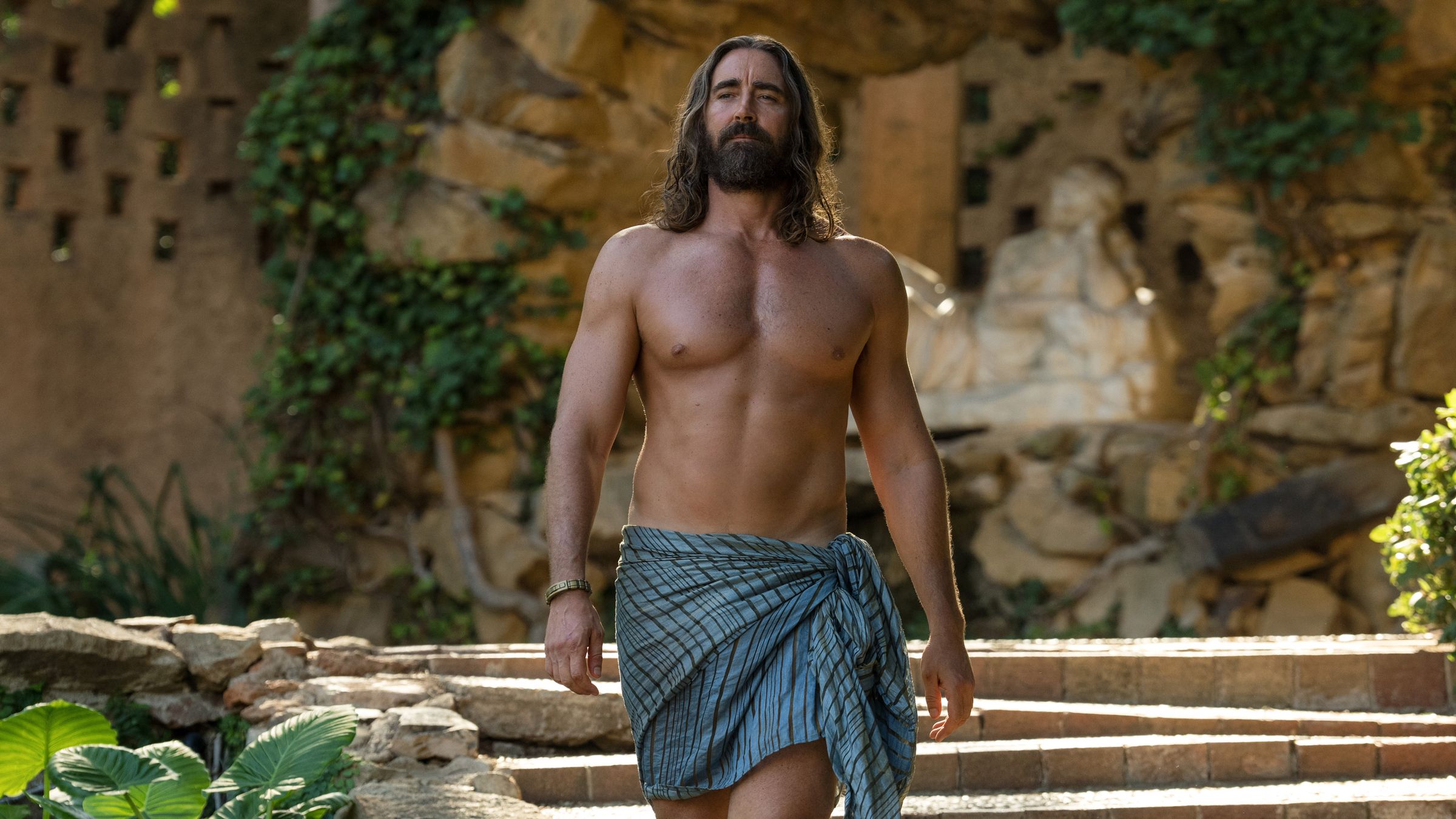In the world of prestige sci-fi, Foundation reigns as the biggest sleeper hit. Mention the Apple TV+ adaptation of Isaac Asimov’s classic series in a group of friends and you’ll suddenly find everyone has been secretly watching it. Something of a flawed masterpiece, the show, which wraps its third season Friday, has been averaging about 1.5 million hours watched per week in the US over the past month, according to Luminate. Not Wednesday numbers, but in the same ballpark as other genre fare like HBO Max’s Peacemaker.
Reasons for the show’s popularity are many, but it’s seemed to have gained traction as it’s become more, well, relevant. The series, like Asimov’s books, focuses on a group of economists using a predictive algorithm to guide the destiny of humanity through the collapse of a galactic empire. Wealthy and powerful people have also found ways to clone themselves and all but live forever. Artificial intelligence and longevity advocates? In 2025, Foundation has proven to be not only one of the smartest sci-fi shows on TV but also one one of the most prescient.
But there’s another appeal for a, shall we say, more specific subset of fans: an oft-shirtless—and for narrative reasons, navel-less—Lee Pace. The Halt and Catch Fire actor plays Cleon, an emperor who achieved immortality of a sort through unusual means. Pace embodies many versions of Cleon, all clones of a long-dead original who created a system in which there are, at any one time, three copies of himself lording over the galaxy. The youngest is known as Brother Dawn; the oldest as Brother Dusk. Paramount among them is Pace’s Brother Day.
Pace clearly enjoys the challenge. Fans enjoy watching him ruthlessly destroy planets and take psychedelic trips, the latter leading them to dub him Brother Dude, after Jeff Bridges’ character in The Big Lebowski. He also appreciates his show’s deeply cerebral bent. When WIRED spoke to him from the set of Practical Magic 2 in London, he was eager to discuss the nature of a clone’s consciousness, carrying around robot heads, and his hopes for the show’s fourth season, which Apple TV+ announced on Thursday. He was also eager to share some of his on-set photos with us (see below).
This interview has been edited for clarity and length and to make the interviewer sound more coherent. It contains lots of spoilers.
TIM MARCHMAN: One of the things that’s really exciting about Foundation is how it projects out current trends. I think this is one of the more serious treatments of cloning and AI technology that we’ve seen. Do you think of the various Cleons as entirely independent entities, or one person who’s on a continuum over thousands of years?
LEE PACE: So that’s kind of the riddle we set up with Cleon. The idea we begin with is that they’re the same person. On Foundation you’ve got these characters that have figured out a way to cheat death, one way or another. You’ve got Gaal, who sleeps through time; you’ve got Hari Seldon, who digitizes his consciousness; you’ve got Demerzel the robot [who has lived thousands of years and serves as aide, mother, and sometimes even lover to generations of Cleons after being enslaved by his dynasty], and you’ve got Cleon, the emperor, who died hundreds of years ago, but he’s cloning himself under this fantasy that it’s the same person.
But that’s impossible. At the end of the first season, we introduce the idea that there is sentience, that they are unique individuals—but it’s true and not true, because they’re the same, and they’re different.
Right, that’s the twist.
In season two, I played a guy who thought he was unique, thought he was the best of them, but he’s no different than the rest. They’re, at the same time, the most valuable body in the galaxy but also utterly replaceable and without value at all, because they’re just meat suits that the robot is carnating. So that’s been fun for me to play as an actor and fun for me as a fan of science fiction to play with that riddle, the idea that they are the same and different.
They also are in different times. Cleon XII, at the very beginning of our series, was growing up at a time of the Empire being incredibly stable, incredibly powerful. And Cleon XXIV, that I play right now, is someone who was raised under the Empire’s contraction, raised with the robot’s kind of increased power.
You saw the season. What do you make of it? What do you make of him in comparison to the others?
I think he’s the most fascinating one, partly because he feels like the most human. There’s the Brother Dude aspect, which I like, but I also like that there’s this switch that seems to flip. He is completely objectifying Demerzel, and then he realizes that she is an intelligence, not an object, and it immediately changes his behavior. It raises some questions to me about whether he’d realized that all along and didn’t want to face it, but that’s the mystery.
That’s what’s interesting about it—the truth was always there, you just didn’t see it because of the emotional weather he was living in. She was always there. She was a prisoner, just like he was. She is capable of so much more than he could even fathom.
Lee Pace on the set of Foundation.
Courtesy of Lee Pace
Did you read the Foundation books before the show? Did you bring any of that to your idea of Cleon?
I’m a huge fan of Isaac Asimov. I came into the show a fan of his work, and I’d read Foundation. But really, the thing I read very early on of Isaac Asimov—and this is totally a detour—was his analysis of the Shakespeare plays. He has this incredible volume where he breaks down the history behind them and what Shakespeare might have intended. Some of the most interesting stuff that he writes about are the robots and humans’ relationship to technology. So I feel like at the end of season three, we’re kind of unlocking some of the richest stuff that Isaac Asimov created inside the Foundation universe.
There are multiple characters in the show who have defeated death, or at least tried to defeat death, with relative levels of success. That’s one of the really fascinating things about it, is seeing these different dynamics between these characters who have copies of their consciousness, or persistent consciousness. What do you think is unique about Cleon as opposed to Demerzel, who are both operating over the same time span but experiencing it in completely different ways?
Definitely me and Laura [Birn, who plays Demerzel] have a great time thinking about this, because there’s a unique relationship that she has with each of the Cleons, but the overall dynamic of the story is their difference. And all the characters—Gaal, Hari—there’s a number of characters that kind of foil each other in a way. It’s a very cerebral show; it’s about the mind. Gaal’s mind, this extraordinary human capability; Hari’s mind, this plan that he has hatched and his ability to kind of forecast; Demerzel, who is an artificial intellect; and then Cleon.
He might be the least, shall we say, intellectual one of the bunch.
What I’ve unlocked, what I found to be really true about him, is that he’s a mess. He’s human and deeply flawed. He thought he was the hero of the story, but in reality there was another hero, and he was the bad guy and he didn’t even consider it. I feel like what is true about Cleon is that he’s got this instinct of, That’s the right way. That’s it. That’s my opportunity.
Very much so.
He puts himself in trouble in messy situations, and then he gets a hunch. I’m gonna follow that. He does, and most of the time it works out for him. I think that’s what happens in this season. That goes back to the inherited nature of Cleon is that he gets this hunch of, I’m gonna get out of the palace, and I don’t know what I’m going to find there, but I have a good feeling about it. And that’s what gets him out. He doesn’t have any idea that he’s going to learn what he learns, he’s going to gain the sense of purpose that he finds. Although it’s not rationality in any way, it’s not logic, I do think it describes a kind of intelligence.
OK, fair.
He’s not a dummy. He’s toe-to-toe with these incredibly intelligent, cerebral minds—but he’s got a very unique kind of cerebral mind, where he’s not conscious of his intelligence. Maybe the truth is that it’s in his DNA, it’s written into that Cleonic DNA, even though he’s never been taught it. You know, it’s there, it’s an instinct to dominate in a way, to come out on top. I can give you my way of thinking about it, but it’s certainly not the only way to think about it.
Lee Pace has been capturing backstage photos with film cameras since he performed in Angels in America on Broadway.
Courtesy of Lee Pace
Lee Pace on the set of the Apple TV+ show Foundation.
Courtesy of Lee Pace
One of the interesting things about this dynamic you’re describing is that Cleon is basically the only major character who is not acting according to the dictates of an algorithm. Part of his journey is discovering that his choices may in fact be driven algorithmically without his having known it, due to Demerzel’s influence, and it raises all these questions about destiny and free will.
But isn’t that kind of what we’ve done this season? He’s rejected the machine at the beginning, and he’s insisted that he’s going to think for himself, even if it means he’s just going to get stoned and hang out in the garden and run away from the trouble, or whatever responsibility or obligation he might have to help. He actually does make a choice to go get that robot head and bring it back to the palace, because he’s the only one who can.
Yes, retrieving a robot head from a murderous cult leader is a choice.
He’s the only one who was raised by a robot—actually, him and his brothers. I think we create this idea at the end of this season that the robots, although he believed them to be no better than a manipulative dishwasher, an iPhone, whatever, in reality they’re like angels, you know? It’s like a goddess that he’s been living with, and he didn’t even see it. And, yes, she created him, but he’s only a very small part of a magnificent plan that’s centuries, centuries old to save humanity. He plays a tiny, tiny part.
It’s something to see him exploring that, especially in the context of our own time, when we’re all guided by our various algorithms and wondering how much of what we do is us and how much is the machines telling us what to do and nudging us ever so slightly.
And once he is humbled to see that, he can act. He can make a choice and act. When he’s stuck in his own pain and self importance and all of that Cleonic bullshit, he can’t make that choice for himself. But once he, in a way, dies and is reborn as a conscious, thinking person, what are the choices he can make? He realizes, Oh, I’ve been in the presence of God my whole life. I’ve had this seraphim guiding me through and kind of cultivating my life. And all I had to do was fulfill the small little role that she had made for me and her mind-blowingly magnificent plan and everything would be OK, you know? So I think that’s what interested me about the story this season.
You haven’t seen the last episode, have you?
No.
I didn’t give anything away just now, did I?
No, no, you were tending in the directions I think had been set up. I’m even more eager to see it now. I do have an acting question: How do you and your fellow actors play the same person who is not the same person?
In the very first season, we created this idea that they sit around dinner and they have the same movements—that that’s a cultural thing among these three people. We had these technical ways of making their shared consciousness visual and actable in. We just practiced it. We came up with this little dance that we would do with those dinner table scenes. In the second season, we did something different with it. We created this idea of one who’s not going to follow the rules, who’s just going to do it differently, whether the other brothers like it or not.
Oh, interesting.
I love working with Terry [Mann, who plays Brother Dusk] and Cassian [Bilton, who plays Brother Dawn] and Laura. It’s such a unique concept that [writer and producer David S. Goyer] had with these cloned emperors that are all living together as family, and there are lots of different ways to look at it. I think it’s a completely original idea, and in line with the questions that Asimov asks in Foundation and his other work.
Lee Pace with (hopefully fake) bloody knuckles and a red iPhone on the set of Foundation.
Courtesy of Lee Pace
Lee Pace working on Foundation.
Courtesy of Lee Pace
I completely agree that it’s a genuinely original idea. There’s always a new way to play basic blues, but this is a really new idea that I can’t think of an antecedent for. Maybe there is one.
It’s about time, too. It’s about time. You can do this thing with time and generations, and that’s what I feel like now we’ve done in season three. We’ve now covered 300 years, and we look back even further.
Much like Asimov did.
He worked on this story over so many different decades, writing the Foundation books, writing them with collaborators and finding ways to tie in other short stories and storylines that he had written in other books and series, and expanding this world of Foundation.
Yes, but I would also imagine that much source material can be overwhelming.
I really love how on this show we have not treated the making of the series like fan fiction, where we would be like, OK, now we do the scene where this happens and now we do the scene where this happens and this happens and this happens. But we let the hugeness of the story that Isaac Asimov left us be on the table, and we can explore the plotlines that he wrote, plotlines that are referred to, plotlines that happen offstage, the plotlines that he discovered later in writing and realizing about the story.
Right, it stays true to the shape of Asimov’s ideas without being beholden to them.
As a science fiction fan myself, I feel like that’s like a good opportunity taken when we could bring it to screen, to use and be inspired by everything we have in front of us with what he has achieved in writing Foundation and then tying in all of these other different stories and plotlines that he had created throughout. I mean, he’s just an incredibly prolific writer.
And one of ever expanding scope. I don’t want to give away anything for any of our readers who might not be familiar with where the books go, but it keeps getting bigger.
Yeah, yeah, exactly, exactly.
Do you see that continuing with the series, the scope continuing to expand?
That’s the opportunity, I think. I hope so. I hope we get a fourth season. [Eds. note: Apple TV+ announced there would be a fourth season of Foundation after WIRED conducted this interview.] I hope we get a chance to expand the story in that way. I feel like that’s what we’ve been doing. There’s a big opportunity for the story to grow, and there are things that David has written throughout the first three seasons that if we do get to continue, there’s definitely some seeds that can grow.




